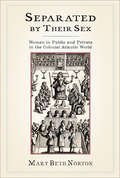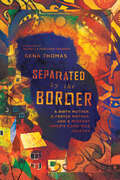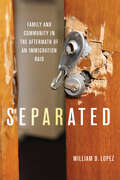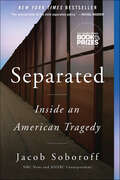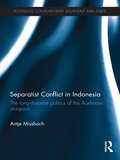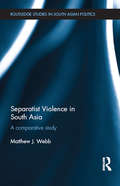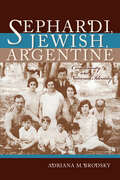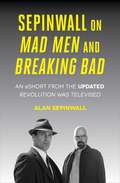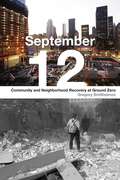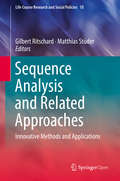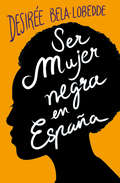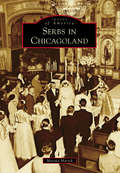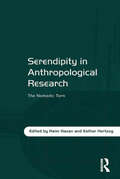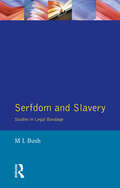- Table View
- List View
Separated by Their Sex: Women in Public and Private in the Colonial Atlantic World
by Mary Beth NortonIn Separated by Their Sex, Mary Beth Norton offers a bold genealogy that shows how gender came to determine the right of access to the Anglo-American public sphere by the middle of the eighteenth century. Earlier, high-status men and women alike had been recognized as appropriate political actors, as exemplified during and after Bacon's Rebellion by the actions of-and reactions to-Lady Frances Berkeley, wife of Virginia's governor. By contrast, when the first ordinary English women to claim a political voice directed group petitions to Parliament during the Civil War of the 1640s, men relentlessly criticized and parodied their efforts. Even so, as late as 1690 Anglo-American women's political interests and opinions were publicly acknowledged.Norton traces the profound shift in attitudes toward women's participation in public affairs to the age's cultural arbiters, including John Dunton, editor of the Athenian Mercury, a popular 1690s periodical that promoted women's links to husband, family, and household. Fittingly, Dunton was the first author known to apply the word "private" to women and their domestic lives. Subsequently, the immensely influential authors Richard Steele and Joseph Addison (in the Tatler and the Spectator) advanced the notion that women's participation in politics-even in political dialogues-was absurd. They and many imitators on both sides of the Atlantic argued that women should confine themselves to home and family, a position that American women themselves had adopted by the 1760s. Colonial women incorporated the novel ideas into their self-conceptions; during such "private" activities as sitting around a table drinking tea, they worked to define their own lives. On the cusp of the American Revolution, Norton concludes, a newly gendered public-private division was firmly in place.
Separated by the Border: A Birth Mother, a Foster Mother, and a Migrant Child's 3,000-Mile Journey
by Gena ThomasIn 2017 five-year-old Julia traveled with her mother, Guadalupe, from Honduras to the United States.
Separated: Family and Community in the Aftermath of an Immigration Raid
by William D. LopezWilliam D. Lopez details the incredible strain that immigration raids place on Latino communities—and the families and friends who must recover from their aftermath.2020 International Latino Book Awards Winner First Place, Mariposa Award for Best First Book - Nonfiction Honorable Mention, Best Political / Current Affairs BookOn a Thursday in November 2013, Guadalupe Morales waited anxiously with her sister-in-law and their four small children. Every Latino man who drove away from their shared apartment above a small auto repair shop that day had failed to return—arrested, one by one, by ICE agents and local police. As the two women discussed what to do next, a SWAT team clad in body armor and carrying assault rifles stormed the room. As Guadalupe remembers it, "The soldiers came in the house. They knocked down doors. They threw gas. They had guns. We were two women with small children... The kids terrified, the kids screaming."In Separated, William D. Lopez examines the lasting damage done by this daylong act of collaborative immigration enforcement in Washtenaw County, Michigan. Exploring the chaos of enforcement through the lens of community health, Lopez discusses deportation's rippling negative effects on families, communities, and individuals. Focusing on those left behind, Lopez reveals their efforts to cope with trauma, avoid homelessness, handle worsening health, and keep their families together as they attempt to deal with a deportation machine that is militarized, traumatic, implicitly racist, and profoundly violent. Lopez uses this single home raid to show what immigration law enforcement looks like from the perspective of the people who actually experience it. Drawing on in-depth interviews with twenty-four individuals whose lives were changed that day in 2013, as well as field notes, records obtained under the Freedom of Information Act, and his own experience as an activist, Lopez combines rigorous research with moving storytelling. Putting faces and names to the numbers behind deportation statistics, Separated urges readers to move beyond sound bites and consider the human experience of mixed-status communities in the small towns that dot the interior of the United States.
Separated: Inside an American Tragedy
by Jacob SoboroffTHE NEW YORK TIMES BESTSELLER"The seminal book on the child-separation policy." —Rachel MaddowThe award-winning NBC News correspondent lays bare the full truth behind America’s systematic separation of families at the US-Mexico border.Los Angeles Times Book Prize Finalist | American Book Award Winner | American Bar Association's Silver Gavel Award FinalistIn June 2018, Donald Trump’s most notorious decision as president had secretly been in effect for months before most Americans became aware of the astonishing inhumanity being perpetrated by their own government—the deliberate separation of migrant parents and children at U.S. border facilities. Jacob Soboroff was among the first journalists to expose this reality after seeing firsthand the living conditions of the children in custody. His influential series of reports ignited public scrutiny that contributed to the president reversing his own policy and earned Soboroff the Cronkite Award for Excellence in Political Broadcast Journalism and, with his colleagues, the 2019 Hillman Prize for Broadcast Journalism.But beyond the headlines, the complete, multilayered story lay untold. How, exactly, had such a humanitarian tragedy—now deemed “torture” by physicians—happened on American soil? Most important, what has been the human experience of those separated children and parents?Soboroff has spent the past two years reporting the many strands of this complex narrative, developing sources from within the Trump administration who share critical details for the first time. He also traces the dramatic odyssey of one separated family from Guatemala, where their lives were threatened by narcos, to seek asylum at the U.S. border, where they were separated—the son ending up in Texas, and the father thousands of miles away, in the Mojave desert of central California. And he joins the heroes who emerged to challenge the policy, and who worked on the ground to reunite parents with children.In this essential reckoning, Soboroff weaves together these key voices with his own experience covering this national issue—at the border in Texas, California, and Arizona; with administration officials in Washington, D.C., and inside the disturbing detention facilities. Separated lays out compassionately, yet in the starkest of terms, its human toll, and makes clear what is at stake as America struggles to reset its immigration policies post-Trump.
Separation Revisited: Adolescents in Foster Family Care (Routledge Revivals)
by Celia DownesFirst published in 1992, this book draws on attachment theory to offer a framework for understanding adolescents’ reactions to the experience of being fostered. It discusses the three-way relationship between adolescents, their birth families and their foster families. The experiences of joining a new school or finding work, going missing and returning, and leaving the foster family at the end of the placement are explored. It identifies aspects of family functioning which appear to be helpful or unhelpful to fostered adolescents and considers the functioning of the wider care system and the role of professionals in it. The book is grounded in the day-to-day experiences of twenty-three families who fostered adolescents who would previously have been considered ‘unfosterable’. These experiences were vividly expressed by the adolescents and foster families and provide rich illustrative material.
Separatist Conflict in Indonesia: The long-distance politics of the Acehnese diaspora (Routledge Contemporary Southeast Asia Series)
by Antje MissbachThe socio-political activities of the Acehnese diaspora, located mainly in Malaysia, Scandinavia, the USA and Australia, have been of fundamental importance to conflict and politics within Aceh. The intensity of the relations between the diaspora and the homeland was mainly determined by the conflict that afflicted the region between 1976 and 2005, and the resulting hardship was experienced by Acehnese both at home and abroad. This book looks at more than thirty years of long-distance politics exercised by the Acehnese diaspora both during the conflict and beyond. It interprets the social, political and cultural aspects of the small-scale conflict in Aceh, as well as focusing on the external factors related to the Acehnese overseas and their impact on homeland politics. The book goes on to contribute to the argument that the Acehnese diaspora had a significant impact on those who remained in Aceh. By focusing on the triangular relationships between the homeland, the host countries and the Acehnese diaspora, the book draws attention to the exchange of people, ideas, and financial and material resources that has occurred. It is a useful contribution to Southeast Asian Politics and Diaspora Studies.
Separatist Violence in South Asia: A comparative study (Routledge Studies in South Asian Politics)
by Matthew J. WebbSince decolonization began in the late 1940s, a series of often lengthy and destructive separatist insurgencies have imposed severe financial, economic and human costs upon the states of South Asia. Whereas previous analyses of these conflicts have typically focussed upon the parent state or separatist group as the relevant unit of analysis, this book adopts a broader framework, arguing that separatism cannot be understood in isolation from the concept of state sovereignty. This book explores the motives, tactics, successes and failures of South Asia’s separatist movements by deconstructing sovereignty into its constituent components and offers an explanation for why separatism, but not political violence, has recently declined in the region. Taking a comparative explanatory viewpoint, it offers a comprehensive review of relevant explanatory theories dominant in the scholarly literature on separatism and an examination of their application to the South Asian states of India, Pakistan, Sri Lanka and Bangladesh. As a thought-provoking discussion of statehood and sovereignty, this book will be of interest to students of political theory, comparative politics, international relations and South Asian politics.
Sephardi, Jewish, Argentine: Community and National Identity (Sephardi And Mizrahi Studies)
by Adriana M. Brodsky“A much-needed monograph on the role of Sephardic Jews in Argentina, and . . . an important contribution to the study of Jews in Latin America overall” (Choice).At the turn of the twentieth century, Jews from North Africa and the Middle East were called Turcos (“Turks”). Seen as distinct from Ashkenazim, Sephardi Jews weren’t even identified as Jews. Yet the story of Sephardi Jewish identity has been deeply impactful on Jewish history across the world. Adriana M. Brodsky follows the history of Sephardim as they arrived in Argentina, created immigrant organizations, founded synagogues and cemeteries, and built strong ties with coreligionists around the country.Brodsky demonstrates how fragmentation based on areas of origin gave way to the gradual construction of a single Sephardi identity. This unifying identity is predicated both on Zionist identification (with the State of Israel) and “national” feelings (for Argentina), and that Sephardi Jews assumed leadership roles in national Jewish organizations once they integrated into the much larger Askenazi community.Rather than assume that Sephardi identity was fixed and unchanging, Brodsky highlights the strategic nature of this identity, constructed both from within the various Sephardi groups and from the outside, and reveals that Jewish identity must be understood as part of the process of becoming Argentine.
Sepinwall On Mad Men and Breaking Bad: An eShort from the Updated Revolution Was Televised
by Alan SepinwallFrom the updated edition of The Revolution Was Televised, Alan Sepinwall's analysis of Breaking Bad and Mad Men, featuring new commentary and insights on the complete series and controversial finales.
September 12: Community and Neighborhood Recovery at Ground Zero
by Gregory SmithsimonThe collapse of the World Trade Center shattered windows across the street in Battery Park City, throwing the neighborhood into darkness and smothering homes in debris. Residents fled. In the months and years after they returned, they worked to restore their community. Until September 11, Battery Park City had been a secluded, wealthy enclave just west Wall Street, one with all the opulence of the surrounding corporate headquarters yet with a gated, suburban feel. After the towers fell it became the most visible neighborhood in New York. This ethnography of an elite planned community near the heart of New York City’s financial district examines both the struggles and shortcomings of one of the city’s wealthiest neighborhoods. In doing so, September 12 discovers the vibrant exclusivity that makes Battery Park City an unmatched place to live for the few who can gain entry. Focusing on both the global forces that shape local landscapes and the exclusion that segregates American urban development, Smithsimon shows the tensions at work as the neighborhood’s residents mobilized to influence reconstruction plans. September 12 reveals previously unseen conflicts over the redevelopment of Lower Manhattan, providing a new understanding of the ongoing, reciprocal relationship between social conflicts and the spaces they both inhabit and create.
Sequence Analysis and Related Approaches: Innovative Methods and Applications (Life Course Research and Social Policies #10)
by Gilbert Ritschard Matthias StuderThis open access book provides innovative methods and original applications of sequence analysis (SA) and related methods for analysing longitudinal data describing life trajectories such as professional careers, family paths, the succession of health statuses, or the time use. The applications as well as the methodological contributions proposed in this book pay special attention to the combined use of SA and other methods for longitudinal data such as event history analysis, Markov modelling, and sequence network. The methodological contributions in this book include among others original propositions for measuring the precarity of work trajectories, Markov-based methods for clustering sequences, fuzzy and monothetic clustering of sequences, network-based SA, joint use of SA and hidden Markov models, and of SA and survival models. The applications cover the comparison of gendered occupational trajectories in Germany, the study of the changes in women market participation in Denmark, the study of typical day of dual-earner couples in Italy, of mobility patterns in Togo, of internet addiction in Switzerland, and of the quality of employment career after a first unemployment spell. As such this book provides a wealth of information for social scientists interested in quantitative life course analysis, and all those working in sociology, demography, economics, health, psychology, social policy, and statistics.
Sequential Analysis and Observational Methods for the Behavioral Sciences
by Vicenç Quera Roger BakemanBehavioral scientists - including those in psychology, infant and child development, education, animal behavior, marketing and usability studies - use many methods to measure behavior. Systematic observation is used to study relatively natural, spontaneous behavior as it unfolds sequentially in time. This book emphasizes digital means to record and code such behavior; while observational methods do not require them, they work better with them. Key topics include devising coding schemes, training observers and assessing reliability, as well as recording, representing and analyzing observational data. In clear and straightforward language, this book provides a thorough grounding in observational methods along with considerable practical advice. It describes standard conventions for sequential data and details how to perform sequential analysis with a computer program developed by the authors. The book is rich with examples of coding schemes and different approaches to sequential analysis, including both statistical and graphical means.
Sequoyah's Gift: A Portrait of the Cherokee Leader
by Janet Klausner Duane KingA biography of the Cherokee Indian who created a method for his people to write and read their own language.
Ser mujer negra en España
by Desirée Bela-LobeddeSer mujer negra en España es un libro necesario para entender el racismo y, sobre todo, para que nunca más se produzca. ¿Cuánto tiempo llevas aquí? ¿Por qué hablas tan bien español? ¿Ya has ido a tu país? ¿Me enseñas tus papeles? ¿De dónde es una belleza tan exótica como tú? ¿Es verdad eso de que las mujeres negras sois unas fieras en la cama? Como una suerte de memorias, que van desde la infancia hasta la adultez, Desirée Bela-Lobedde, activista afroespañola, nos cuenta cómo es vivir siendo mujer y negra en España, cómo es sentirse siempre diferente y cómo es ser testigo del racismo que todavía existe en este país. Y lo hace desde el corazón y desde la profunda convicción de que esto puede cambiar y que, finalmente, todos podemos llegar a ser mejores personas si dejamos los prejuicios y la intolerancia de lado.
Ser o aparentar: Los entresijos de la manipulación global
by Javier ArgüesoAtrévete a descubrir todo tu potencial para desafiar el orden global establecido. ¿Y si tuvieras a tu alcance el control del más maravilloso y potente videojuego que pudieras imaginar? <P><P>Tal vez, simplemente, te lo han ocultado para hacerte creer que debes resignarte a un destino regido por los poderes dominantes -por más que este no te guste-. Atrévete a averiguar las claves que te pueden proporcionar algunas respuestas y algunos hechos esenciales de conocer y que, quizás, jamás te contaron. <P><P>Nuestro universo neuronal encierra un potencial infinito del que apenas conocemos nada. ¿Cómo funciona nuestro cerebro?, ¿actuamos con libre albedrío o respondemos a una programación previa?, ¿somos tan conscientes e inteligentes como creemos?, ¿cuáles son las mayores manipulaciones que nos afectan?, ¿hay alternativas?...
Serbian Australians in the Shadow of the Balkan War (Routledge Revivals Ser.)
by Nicholas G ProcterThis title was first published in 2000: Although the main tragedy of the wars which first erupted in 1991 in former Yugoslavia lies within the Balkan region, the war's shadow is global in outreach. Using a mainly ethnographic approach, this is an exploration of how the Balkan wars have affected the everyday life and mental health in particular of Serbian immigrants and their families in Australia, and how they have responded to long-distance grief, devastation and dislocation. The work examines how the mass media has enabled migrants to see and feel the impact of events happening in their homeland more vividly than in any previous conflict and how the international consensus which blames the Serbs for perpetrating the wars has stigmatized this immigrant community. In doing so, the author, who is a mental health expert, deals with issues of globalization, fragmentation and adaptation of national and cultural identities, grief and alienation, and the effects of these on mental health and well-being.
Serbian Australians in the Shadow of the Balkan War (Routledge Revivals Ser.)
by Nicholas ProcterThis title was first published in 2000: Although the main tragedy of the wars which first erupted in 1991 in former Yugoslavia lies within the Balkan region, the war's shadow is global in outreach. Using a mainly ethnographic approach, this is an exploration of how the Balkan wars have affected the everyday life and mental health in particular of Serbian immigrants and their families in Australia, and how they have responded to long-distance grief, devastation and dislocation. The work examines how the mass media has enabled migrants to see and feel the impact of events happening in their homeland more vividly than in any previous conflict and how the international consensus which blames the Serbs for perpetrating the wars has stigmatized this immigrant community. In doing so, the author, who is a mental health expert, deals with issues of globalization, fragmentation and adaptation of national and cultural identities, grief and alienation, and the effects of these on mental health and well-being.
Serbs in Chicagoland
by Marina MarichChicagoland boasts the world's largest population of Serbs outside of Serbia. Seeking economic opportunities and religious freedom, Serbs first settled in the area more than 100 years ago. Many found work in steel mills and other industries along the banks of Lake Michigan. The first Serbian Orthodox church in the Chicago area began serving parishioners in 1911, and more than a dozen additional congregations were built for the growing numbers of Serbs who arrived after World War II. Civic organizations, such as the Circle of Serbian Sisters, were established to honor and uphold customs from the "old country." Traditional Kolo dancing groups, tambura ensembles, and performance troupes have entertained Serbs and non-Serbs alike. Actor Karl Malden, perhaps the most famous Serbian American from the Chicagoland area, first took the stage in theater productions at his family's Gary, Indiana, Serbian Orthodox church. After the devastating wars in the Balkans in the 1990s, a new wave of Serbian immigrants arrived in Chicago, demonstrating that the city remains a welcoming place due to its abundance of Serbian culture, churches, and community.
Serendipity in Anthropological Research: The Nomadic Turn
by Haim HazanChallenging the idea that fieldwork is the only way to gather data, and that standard methods are the sole route to fruitful analysis, Serendipity in Anthropological Research explores the role of fortune and happenstance in anthropology. It conceives of anthropological research as a lifelong nomadic journey of discovery in which the world yields an infinite number of unexplored issues and innumerable ways of studying them, each study producing its own questions and demanding its own methodologies. Drawing together the latest research from a team of senior scholars from around the world to reflect on the experience of research, Serendipity in Anthropological Research presents rich new case studies from Europe and the Middle East to examine both new and old questions in novel and enriching ways. An engaging examination of methodology and anthropological fieldwork, this book will appeal to all those concerned with writing ethnography.
Serenity Found: More Unauthorized Essays on Joss Whedon's Firefly Universe
by Jane EspensonA lot has happened since Finding Serenity. We learned River's secret; Mal took on the Alliance. Our favorite crew became Big Damn Heroes. And the Browncoats proved that hard work, passion and a little fan coordination can do the impossible. Serenity Found takes the contents of Finding Serenity even further, exploring not just the show but the events of the film as well, to create an anthology that's even more thought-provoking, fascinating and far-thinking than its predecessor. * Acclaimed science fiction author Orson Scott Card lauds "Serenity" as film sci-fi finally done right * Writer and comedian Natalie Haynes reveals the real feminist savvy of the "Firefly" universe: the girls get the guns and the gags * Pop culture critic Michael Marano connects damaged, ass-kicking River to the other weaponized women of the Whedonverse * Multiverse executive producer Corey Bridges explains why the world of "Firefly" is the perfect setting for an MMORPG * Mutant Enemy's visual effects wizard Loni Peristere relates what he's learned from Joss about telling stories, and tells a story of his own about Serenity's design * Television Without Pity recapper Jacob Clifton frames "Serenity" as a parable about media: how it controls us, how we can control it and how to separate the signal from the noise * And Nathan Fillion, "Firefly" and "Serenity's" Captain Malcolm Reynolds, shares his affinity for Mal and his love of Mal's ship and crew.
Serenity in the Storm: Living Through Chaos by Leaning on Christ
by Kayleigh McEnanyKayleigh McEnany brings to life the key cultural and political issues of our time, from the fall of Afghanistan to the Supreme Court&’s abortion decision, analyzing world events through the lens of faith and providing readers with Serenity in the Storm.Our world, without question, is experiencing aberrational times. The ravages and life-altering realities of COVID-19 that I worked through as White House press secretary were just the start of it. What followed was a series of history-defining events. From the fall of Afghanistan to the nationwide crime wave, we&’ve all endured painful images of death, destruction, and chaos. Meanwhile, radical teachings on gender and race have infiltrated our nation&’s schools, poisoning the minds of our children—all at a time when our country feels more divided than ever before. Along with these twenty-first century realities can come a feeling of despair and discouragement. Indeed, I hear it all the time as I crisscross the country: Americans feel disheartened and seek hope. Serenity in the Storm provides that hope. Despite the challenges we face, there is cause for great optimism for men and women of faith. In Afghanistan, the underground church is thriving. On the key issues of life and liberty, the Supreme Court of the United States has delivered enormous and consequential victories. In our schools, voters have spoken unmistakably against the insidious doctrines of critical race and gender theory. There is no doubt that God is at work as He hears the prayers of the faithful! Taking a similar format to my New York Times bestselling book, For Such a Time as This, I analyze our domestic and international challenges through the lens of faith. Though we have lived through dark times and unsettled waters, the storms we face have prompted many great leaders to rise to the moment and have left a yearning in the human heart for a Savior, Jesus Christ, who is walking alongside us every step of the way.
Seres de luz y entes de la oscuridad
by Lucy AspraDe verdad no estamos solos, y los Ángeles nos protegen con su luz celestial De Lucy Aspra, experta a nivel internacional en temas de ángeles y seres espirituales. Las rigurosas investigaciones de Lucy Aspra, sustentadas por una bibliografía espléndida y una escritura clara y envolvente, sorprenden no sólo por sus revelaciones, sino también por su extraordinaria capacidad para situar en su justo lugar a las presencias luminosas y a las entidades del mal. La autora de Seres de luz y entes de la oscuridad cierra una de las investigaciones del mundo sobrenatural más impactantes de los últimos años (iniciada con Ángeles y extraterrestres y Batalla cósmica, publicados por Alamah), en este tercer volumen nos enseña a reconocer la presencia y los prodigios de los ángeles, el maravilloso poder de la oración y la forma en que fuerzas negativas, a veces, se manifiestan a través de los duendes y los extraterrestres. Analiza el propósito de los mensajes subliminales y la manera de sobreponerse a sus efectos nocivos; hace un recuento de energías subterráneas y deidades peligrosas, para concluir con una reflexión sobre el amor y su energía vital. No hay duda de que esta obra estremecerá a los lectores y los obligará a una reflexión profunda para advertir que los brujos extraterrestres, las posesiones demoníacas y los exorcismos no son sólo una macabra fantasía.
Serfdom and Slavery: Studies in Legal Bondage
by M. L. BushSerfdom and Slavery compares the two forms of legal servitude in cultures in Western civilization, in Europe and the New World from ancient times to the modern period. Within a tightly controlled framework of general contextual chapters followed by specific case studies, a distinguished team of scholars offers 17 specially written essays that illuminate the nature, development, impact and termination of serfdom and slavery in European society. While the case studies range form classical Greece to early modern Brandenburg, and from medieval England to nineteenth-century Russia, the volume as a whole is closely integrated. It makes an important contribution to a topic of increasing international interest.
Serial Girls: From Barbie to Pussy Riot
by Martine DelvauxEverywhere you look patriarchal society reduces women to a series of repeating symbols: serial girls. On TV and in film, on the internet and in magazines, pop culture and ancient architecture, serial girls are all around us, moving in perfect sync—as dolls, as dancers, as statues. From Tiller Girls to Barbie dolls, Playboy bunnies to Pussy Riot, Martine Delvaux produces a provocative analysis of the many gendered assumptions that underlie modern culture. Delvaux draws on the works of Barthes, Foucault, de Beauvoir, Woolf, and more to argue that serial girls are not just the ubiquitous symbols of patriarchal domination but also offer the possibility of liberation.
Serial Homicide
by Agnieszka DaniszewskaThis Brief provides an overview and history of the definition of serial homicide, from the perspectives of psychology, medicine, criminology and forensics. It reviews research to provide a standard definition of serial homicide (as opposed to multiple or mass homicide), and provide insights on profiles of victims and offenders for police practitioners. It also includes a discussion of the media approach to covering serial homicide. The Brief is divided into four major sections covering: definitions and overview of serial homicide, profiling perpetrators according to different typologies, profiling victims, applied case studies, and recommendations for investigation and prevention. The author's approach is aimed primarily at researchers in police studies, but will be of interest to researchers in related fields such as criminal justice, sociology, psychology, and public policy.
